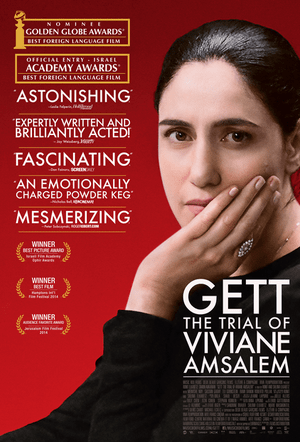Film Review: "Gett: The Trial of Vivian Amsalem"
With a running time of 1 hour 56 minutes, Gett might seem to be quite a long film, but every minute of it is riveting and holds the viewer's undivided attention.
Directed and written by the sister-brother team of Ronit and Shlomi Elkabetz and based partly on their own family history, this gripping courtroom drama set in Israel traces a Moroccan Jewish woman's effort to obtain a gett, or religious divorce, after years of a loveless marriage. In Israel, there is neither civil marriage nor civil divorce; only Orthodox rabbis can legalize a union or its dissolution, which is only possible with the husband’s full consent.
In the film, Viviane Amsalem, powerfully played by Ronit Elkabetz (Sh'chur, Late Marriage and The Band's Visit) has applied for a divorce for three years but her religiously devout, traditional husband Elisha continually refuses. His cold intransigence and her determination to fight for her freedom result in five more years of delays and appeals before the rabbinical judges.
The film's subtitle The Trial of Viviane Amsalem refers to Amsalem's dual trials of having to wait so long to obtain a divorce and being put on trial for the failure of the marriage. After all, as her brother testifies, Elisha doesn't beat her, isn't unfaithful, and provides for her and their children. Yet when asked to characterize the tone of their marriage, he concedes it is "bitter as gall."
While praising her qualities as a housekeeper and mother, Viviane’s brother, other witnesses, and the rabbinical judges themselves believe it's her fault that the couple can't get along. The camera highlights her small acts of rebellion such as wearing pants to a religious court, appearing barelegged in short skirts, barefoot in sandals, and at one point letting her hair down before the judges.
Viviane is chained to her husband and this is reflected cinematically by the claustrophobic atmosphere of the film. Almost every scene is set in the confined, bare courtroom except for a few shots in a cramped waiting room and one or two poignant shots of Vivian longingly looking outside through a window.
Although rabbis claim that they do everything to help wives, because of shalom bayit (peace in the home) the reality is that the law clearly favors the husband's will over the wife's wishes. Incompatibility is clearly not considered an acceptable reason for divorce. "Does my wife fit me?" one witness asks. "No, but I make her fit." Because of the rabbis’ “sacred duty” to do everything possible to preserve a Jewish household, they claim reluctance to put the personal wish to end a marriage above religious duty. The result is a mixture of absurdity and tragedy.
Gett: The Trial of Viviane Amsalem is the final part of a trilogy of films made by the Elkabetz team: To Take A Wife (2004) and Shiva (2008). It won the Israeli Film Academy Ophir Award for Best Picture and was short-listed for Best Foreign Film for the Academy Award and for the Golden Globes.
In a year of extraordinary Israeli films made by women directors (Zero Motivation, Self-Made, That Lovely Girl), Gett is a highly relevant, resonant film that shouldn’t be missed.
Ronit Elkabetz & Shlomi Elkabetz, directors/writers
Year of Release: 2014
Running time: 1 hr. 56 min.
Distributor: Music Box Films








The individuals and institutions promoting the rights of women make an admirable work, but sometimes, a film such as Gett is able to show us how much is still left to do in a much more devastating and memorable way, specially in regions of the world in which rules haven't changed enough throughout the centuries. And the fact that the film achieved that without any exaggeration or dull sermons reflects the brilliant work from co-directors and co- screenwriters Ronit (who was also the leading actress) and Shlomi Elkabetz. I also have to make the warning that Gett is a movie whose minimalistic structure and paused rhythm might end up boring some spectators (even though that wasn't my case). The film is exclusively developed inside the austere offices of a court in Israel, in which three wise rabbis judge and rule civil disputes. In this occasion, lawyer Carmel Ben Tovim requests the dissolution of the marriage between Viviane and Elisha, who has apparently been a model husband throughout the years. However, Viviane isn't entitled to separate due to the absence of concrete causes (such as abuse, adultery, etc.) and the husband is left the right to grant the divorce, even if his wife has been suffering an unhappy and incompatible marriage. In other words, Viviane is practically a slave without any rights or control over her destiny. And that's what the whole film basically consists on. The months of trial are extended to years while both sides of the conflict present witnesses, expose reasons and try to convince the judges. The process is obviously more difficult for Viviane, since her happiness and wish of marital freedom don't seem to be relevant factors in the legal process; law is always on her husband's side, while the judges don't even comprehend the woman's motivation. Even the witnesses appointed by her lawyer have difficulties to justify a divorce when none of the "normal" reasons are present. Why does Viviane not stay quiet and accept her devout wife role? And the most interesting thing is that none of that comes from intentional malice, but the combination of patriarchal culture with laws and traditions of a very slow evolution. The performances are excellent, since all the actors feel absolutely credible as authentic individuals with very particular interpretations about justice and spirituality. Apparently, Gett is the third part of a trilogy, but I don't think it's necessary to have watched the previous films in order to appreciate the remarkable attributes from this movie as well as its cultural and ideological value. In summary, I recommend Gett with enthusiasm because of its fascinating screenplay, perfect performances and austere direction which doesn't require the traditional ornaments of legal drama in order to captivate us and leave us thinking. Thinking specially about the blessing of being single.
Watch it for free on Terrarium TV.
As modern as Israel is, the population is still bound to laws which do not recognize the rights of women. This films highlights not only the difficulties of getting a Gett, but the necessity for creating new opportunities for civil marriage and divorce options. The film was certainly powerful with captivating perfomrances.
I just saw the film last weekend, and I agree that it was extremely good. My frustration rose along with Viviane's! There were a couple of moments of comic relief, and I did long at times to see a bit of Viviane's life outside the courtroom, so as to "judge for myself."